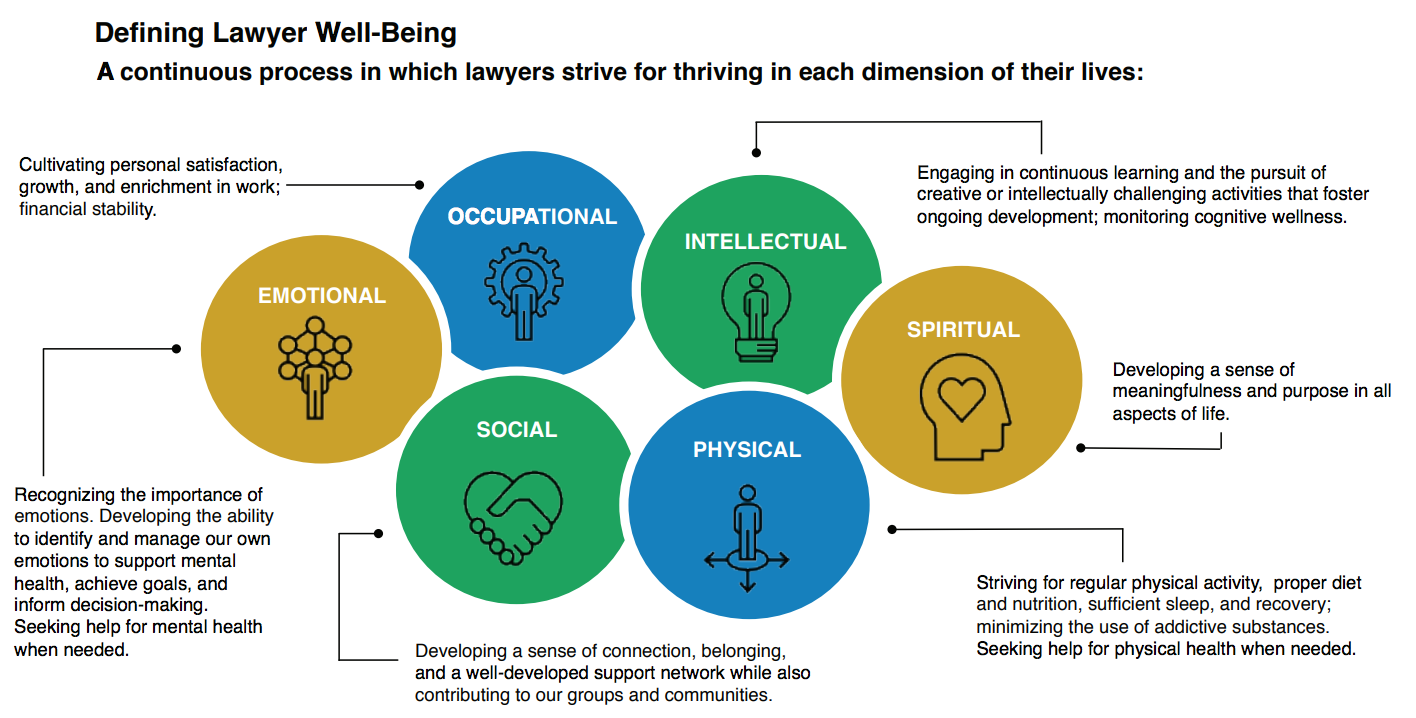Last week, the National Task Force on Lawyer Well-Being issued a 73-page report on “creating a movement to improve well-being in the legal profession.”
The report states what we know from the data: “To be a good lawyer, one has to be a healthy lawyer. Sadly, our profession is falling short when it comes to well-being.”
Well-being is defined as the “continuous process whereby lawyers seek to thrive in each of the following areas: emotional health, occupational pursuits, creative or intellectual endeavors, sense of spirituality or greater purpose in life, physical health, and social connections with others.”
Well-being is not just about physical health. The multi-dimensions of lawyer well-being. https://t.co/ZyymMo61oc pic.twitter.com/3mu9Ffmdnw
— Jeena Cho 조지현 (@Jeena_Cho) August 20, 2017
Included in the report is suggestions for bar associations, legal employer and other stakeholders for increasing well-being in the legal profession. You can access the full report here.
There recommendations for increasing well-being for legal employers includes the following:
Form A Lawyer Well-Being Committee
Lawyers love to form committees but surprisingly, many law firms don’t have a well-being committee. This is an obvious place to start. If your firm doesn’t have a well-being committee, start one!
From the report, “…legal employers should launch a well-being initiative by forming a Lawyer Well-Being Committee or appointing a Well-Being Advocate.” [sta_anchor id=”#jump”]
Assess Lawyers’ Well-Being
Gathering data should be a cornerstone of any well-being programs. Measure the impact of well-being programs.
Some suggestions for assessment:
- an anonymous survey conducted to measure lawyer and staff attitudes and beliefs about well-being
- stressors in the firm that significantly affect well-being
- organizational support for improving well-being in the workplace
Monitor For Signs of Work Addiction and Poor Self-Care
Burnout, chronic stress and anxiety is sadly the reality for too many lawyers in law firms. The report suggests establishing policies and practices to support lawyer well-being.
Numerous health and relationship problems, including depression, anger, anxiety, sleep problems, weight gain, high blood pressure, low self-esteem, low life satisfaction, work burnout, and family conflict can develop from work addiction.
Another suggestion is to de-emphasize alcohol at law firm social events. This is a topic that comes up frequently in my conversations on planning wellness events.
My advice is to not eliminate alcohol but rather offer alternatives and have events that does not involve alcohol.
For example:
- Offer a non-alcoholic signature drink
- Use drink coupons to reduce excess consumption
- Have a morning yoga, meditation, fun run/walk the morning after a social event involving alcohol
Actively Combat Social Isolation and Encourage Interconnectivity
One of the most common thing I hear from lawyers who are struggling from chronic stress/anxiety, depression, alcohol/substance abuse is this — the feeling of isolation perpetuates the problem.
As discussed in the report, “Social support from colleagues is an important factor for coping with stress and preventing negative consequences like burnout.”
Work on creasing a work environment where it’s safe to talk about personal struggles. For example, it would be acceptable to talk about your struggles with cancer at the office, right? Similarly, it should be okay to talk about mental health issues.

